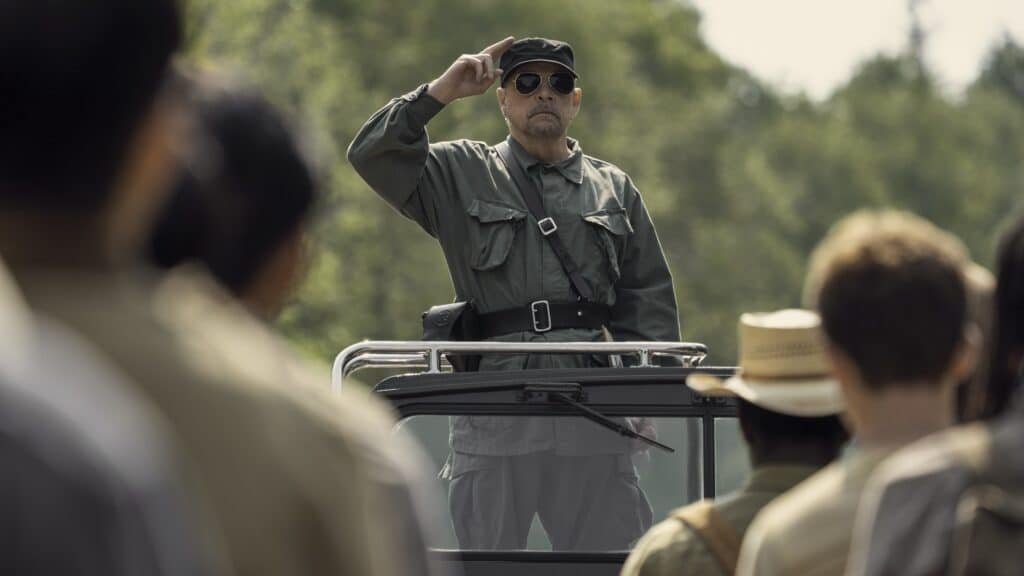‘The Long Walk’ Review
A group of boys competes in a deadly contest of physical endurance in the latest Stephen King adaptation, ‘The Long Walk’.
‘The Long Walk’, from director Francis Lawrence, is the latest Stephen King adaptation in a recent onslaught – in the last couple years there has been ‘Salem’s Lot’, ‘The Monkey’, ‘The Life of Chuck’, and ‘The Running Man’ still to come. While the quality in these adaptations ranges from disappointing to thrilling, humorous to sentimental, ‘The Long Walk’ is perhaps the best distillation of King’s true strengths – a bleak, hopeless horror elevated by a humane attention to character and boosted further by knockout performances.
The film opens with Ray Garraty (Cooper Hoffman), being dropped off at the starting line for the titular Long Walk. His mother begs him to drop out, to find a substitute, but Ray insists on going, brushing off his mother’s worries as he is eager to join the competition wherein fifty boys, one from each state, tests their ability to walk as long as possible in the hopes of being victorious, winning untold wealth and a single wish. Of course, this is no casual competition.
If you drop below three miles per hour, you die.
If you leave the road, you die.
And if you do everything right, if you keep on walking as long as you can, your body will eventually betray you. And you will die.
The world that supports this bloody contest is dystopian while resonating greatly with our current economic circumstances. Originally written as Stephen King’s response to the Vietnam War, the themes and worldview feel more relevant than ever with our country in free fall, the American Dream at risk as wealth disparity grows greater everyday and empathy for our neighbors continues to dwindle. These boys are willing to risk a 98% chance of death, because the 2% chance at winning is better odds than just existing within an economic system of oppression, with no hope for betterment or happiness. The Long Walk, like ‘The Hunger Games’ or ‘Squid Game’, exploits the desperation of the working class, cruelly using their hopes and dreams against them for bloody mass entertainment wrapped in the idea that the act of competing is not just brave, but patriotic. All this ignoring the fact that nobody really volunteers for the contest – when every boy in the country “volunteers”, it is less an option than the solitary hope to escape from the desolation all around.
While there are a few flashbacks, the bulk of the movie takes place as the boys walk from Point A to Point B. Such a linear, simple story could become repetitive and dull, but Francis Lawrence doesn’t shy away from the brutality of this walk, vividly fixating on the million different ways your body can betray you when you push it for days without sleeping, cleaning, or going to the bathroom. The violence, when it comes, is visceral and horrific, made even more jarring by the fact that all of the victims are young boys whose only crime was believing they ever had a chance at survival.

As a writer Stephen King has excelled at depicting evil writ large and small. There can be villains imposing and impersonal – an evil clown that feeds on the terror of children or, in this case, a brutal government with no qualms about using violence to deter all challengers – but also small scale and human, which can often feel more immediate and terrifying. Just as Ray builds friendships along the walk, most movingly with Pete McVries (David Jonsson), he also butts heads with the more cutthroat competitors like Barkovitch (Charlie Plummer), who acts crudely to the other boys as he refuses to shy away from the reality of the situation – in order to win, you need to want the other boys to die.
This film would work nowhere near as well without a committed, bravura cast, and every performance is strong and nuanced. While we don’t meet all fifty of the competing boys, the ones we do meet are able to establish a sense of self, of dimensionality, in the few lines they are given. Each character, even the needling Barkovitch, is treated with care and the performances round out all of the boys into real flesh and blood human beings. As the protagonist, Cooper Hoffman brings a quiet strength, even as he is filled with fear that he’s not good enough and anger at the world that has driven him to this. But it’s David Jonsson as McVries who steals the show as a boy encouraging friendship throughout the journey even as he struggles with his own deeply felt sadness just under the surface. It is a powerhouse performance of just a regular boy, trying his best to put a smile on another boy’s face even as the effort wears on him.
All of the competitors, from the heroic to the more villainous, have moments of humanity that endear them to the viewer, making each inevitable death heartbreaking. They are all tragic figures who are forced into this blood thirsty contest even as Major and the system he represents insists upon their own greatness despite being unable to offer alternative paths to success and happiness.
The ending is sudden and surprising, diverting from the source material in order to make a more pointed statement with mixed results. Even with a less satisfying ending, ‘The Long Walk’ succeeds as a grim and pessimistic horror, portraying a sadistic late stage capitalist dystopia that takes advantage of the dreams of youth to feed blood soaked entertainment to the masses.
The Long Walk
Rated R for strong bloody violence, grisly images, suicide, pervasive language, and sexual references.
Running Time: 1 hour and 48 minutes
Director Francis Lawrence
Writers JT Mollner
Stars Cooper Hoffman, David Jonsson, Garrett Wareing, Tut Nyuot, Charlie Plummer, Ben Wang, Roman Griffin Davis, Jordan Gonzalez, Josh Hamilton, Judy Greer, Mark Hamill
Rating R
Running Time 108 Minutes
Genres Horror
